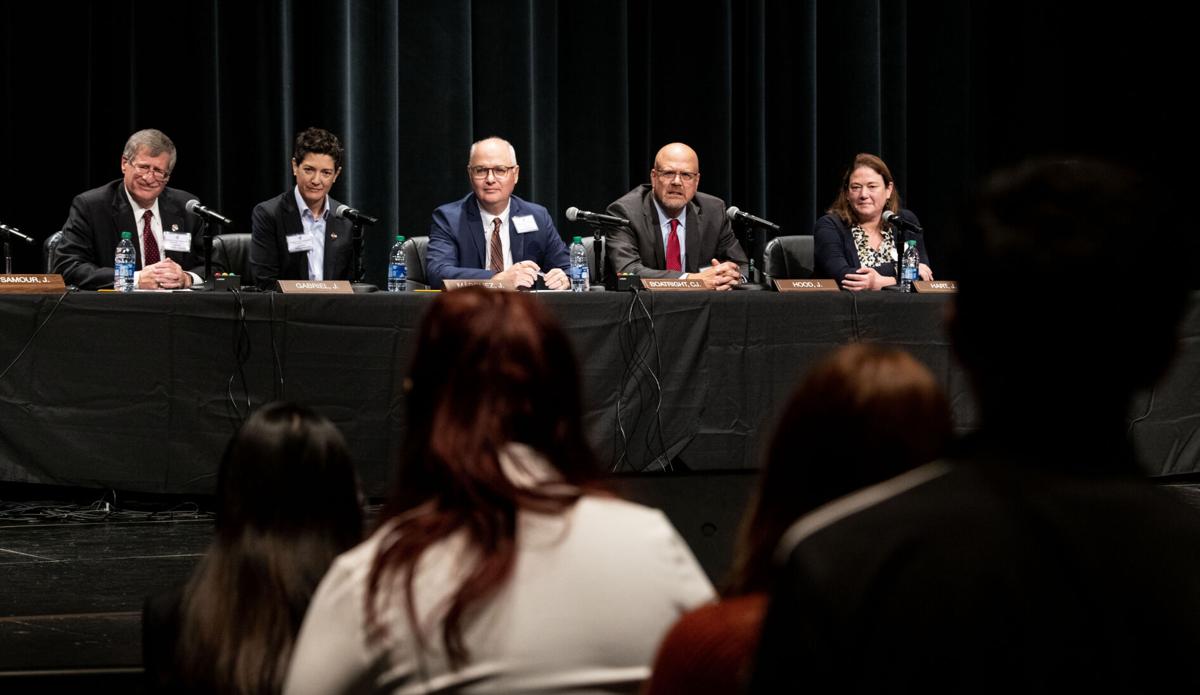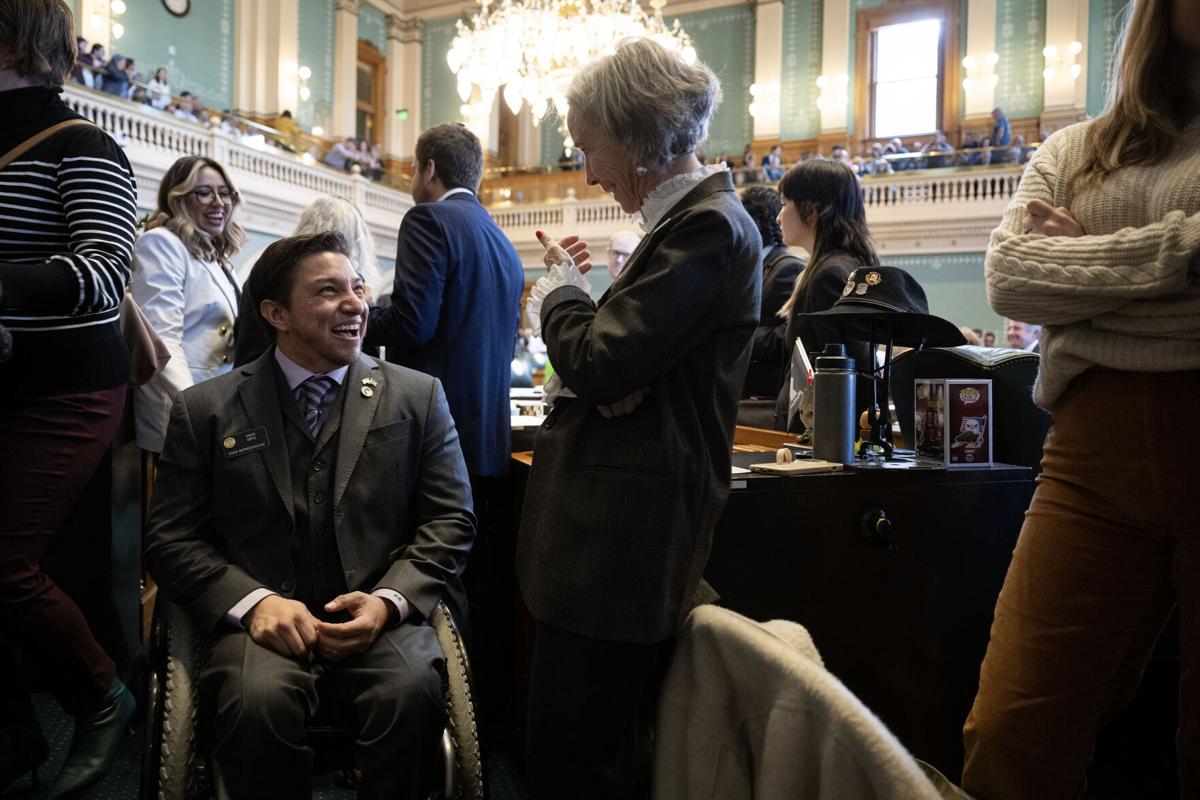Divided Colorado Supreme Court rules government can re-evaluate juvenile defendants without court order
RnJvbSBsZWZ0LCBDb2xvcmFkbyBTdXByZW1lIENvdXJ0IEp1c3RpY2VzIFJpY2hhcmQgTC4gR2FicmllbCBhbmQgTW9uaWNhIE0uIE3DoXJxdWV6IGFuZCBDaGllZiBKdXN0aWNlIEJyaWFuIEQuIEJvYXRyaWdodCBsaXN0ZW4gdG8gYW4gYXJndW1lbnQgZHVyaW5nIGEgQ291cnRzIGluIHRoZSBDb21tdW5pdHkgc2Vzc2lvbiBoZWxkIGF0IFBpbmUgQ3JlZWsgSGlnaCBTY2hvb2wgaW4gQ29sb3JhZG8gU3ByaW5ncyBvbiBUaHVyc2RheSwgTm92LiAxNywgMjAyMi4gKFRoZSBHYXpldHRlLCBQYXJrZXIgU2VpYm9sZCk=
UGFya2VyIFNlaWJvbGQ=
The Colorado Supreme Court, by 5-2, ruled on Monday that the state may rely upon its evaluation of a juvenile defendant who was previously found not competent to proceed, even though the evaluation happened without a judge’s order.
The clarification took on significance because of a 2023 law that enacted protections for juveniles who receive services to restore their competency in the equivalent of criminal proceedings. The legislature specified that restoration evaluations, as they are known, should occur when the need for an evaluation “outweighs the negative impact” on the juvenile.
Justice Brian D. Boatright, in the court’s April 14 opinion, wrote that nothing prevents the government from evaluating a juvenile in the course of providing services aimed at making the defendant competent to stand trial. He noted it was logical for the Colorado Department of Human Services to be able to understand how well a juvenile is progressing by formally evaluating them.

“For a court to meaningfully review a juvenile’s progress toward restoration, it must be informed of the juvenile’s current competency status. And for the Department to provide such information, it must be able to evaluate the juvenile’s competency,” he wrote.
Justice Richard L. Gabriel, writing for himself and Justice William W. Hood III, believed that approach flew in the face of what the legislature intended. The department could theoretically perform repeated evaluations on a child without a judge having weighed the potential negative impact.
The law “does not delegate authority to the Department to provide those services that it deems appropriate whenever it deems them appropriate,” Gabriel wrote.

FILE PHOTO: Students from Pine Creek High School ask the justices of the Colorado Supreme Court questions after watching them hear arguments from two cases in the high school auditorium on Nov, 17, 2022. Pictured from left to right are Justice Richard L. Gabriel, Justice Monica M. Márquez, Chief Justice Brian D. Boatright, Justice William W. Hood III and Justice Melissa Hart.
Parker Seibold/The Gazette
Justice Maria E. Berkenkotter wrote separately, officially labeling her opinion as a concurrence. However, it functioned more as a dissent, making the decision 4-3 on the underlying reasoning. She, too, believed the department should not be allowed to conduct evaluations on child defendants without a court order.
“In the Department’s and the majority’s telling, restoration evaluations are nothing more than a harmless tool to assess a juvenile’s progress toward restoration. This view is at odds with the General Assembly’s direction,” Berkenkotter argued.
Sen. Judy Amabile, D-Boulder, one of the sponsors of the 2023 change to juvenile competency evaluations, said she agreed with the dissenting justices, and that it was not her intent to allow evaluations to occur without oversight.
“We are considering our options to clarify this with future legislation,” she said.
Evaluations as a ‘service?’
In the underlying case, El Paso County prosecutors charged a juvenile, identified as J.D., in multiple cases. At the request of the defense, a doctor with the Department of Human Services performed a competency evaluation in the summer of 2023. The doctor found J.D. not competent, meaning a disorder, developmental disability or his mental capacity did not allow him to consult with his attorney or assist in his own defense because he did not understand the proceedings.
A judge ordered the department to oversee restoration services for J.D., which could include education, medication, psychiatric treatment or other therapy. The department was also to provide regular reports about the progress, eventually occurring every 35 days.
In March 2024, a new doctor evaluated J.D. and determined he had been restored to competency. The department characterized it as a “court ordered” evaluation, but in reality there had been no judge’s order for it.
The defense moved to disregard the evaluation. J.D.’s attorney pointed to House Bill 1012, enacted in 2023 in response to another Supreme Court decision about evaluations of juvenile defendants. The law provided, in part, that if “the court or a party” asks for an evaluation to determine if a juvenile defendant has had his competency restored, there are certain factors a trial judge must consider, including the potential negative effects of an evaluation on the child.

Rep. Judy Amabile and Rep. David Ortiz share a laugh during the first day of Colorado's 2023 session at the Colorado State Capitol building on Monday, Jan. 9, 2023, in Denver, Colo.(Timothy Hurst/The Denver Gazette)
TIMOTHY HURST/DENVER GAZETTE
The trial judge in J.D.’s case, however, noted an adjacent provision of the law, not changed by HB 1012, made the department “responsible for the oversight of restoration education and coordination of services necessary to competency restoration.” Based on that responsibility, the judge decided the department was within its rights to evaluate J.D. because the evaluation was “a service necessary to competency restoration.”
J.D. then appealed to the Supreme Court, asking it to weigh in on the department’s authority for the first time.
‘Expansive view’ of authority
The court’s majority agreed that restoration evaluations, “by their very definition,” allow the department to fulfill its responsibility to monitor how well its services are working.
“To require the Department to seek a court order every time it sought to evaluate a juvenile’s progress toward restoration would frustrate this legislative directive,” wrote Boatright in upholding the department’s actions.
Gabriel, in dissent, believed a restoration evaluation did not fall under the umbrella of a “service” the department provides to defendants. Instead, it was something to be done at the direction of a judge, with HB 1012 laying down specific factors for judges to consider.
“These limitations reveal a clear legislative intent to limit the court’s discretion in deciding whether and when to order a restoration evaluation,” he wrote, “and I perceive no basis in the statutory text that would allow me to conclude that although the legislature intended to limit the court’s discretion, it gave unlimited discretion to the Department.”

Colorado Supreme Court Justice Maria E. Berkenkotter asks a question during oral arguments at Courts in the Community on Thursday, Oct. 26, 2023, at Gateway High School in Aurora, Colo. (Timothy Hurst/Denver Gazette)
Timothy Hurst
Berkenkotter, in her concurrence, explained she did not share the dissent’s view that J.D.’s evaluation needed to be rejected outright. Instead, she would have directed the trial judge to apply the factors from HB 1012 to decide whether the evaluation was valid.
However, Berkenkotter otherwise slammed the majority opinion for prioritizing convenience to the government over what she saw as lawmakers’ intent.
“I do not know how to square the majority’s expansive view of the Department’s authority, which seems to have no limits, with the very specific limits the General Assembly imposed,” she wrote. “It is utterly illogical, in my view, to conclude that the General Assembly charged juvenile courts with applying this balancing test but placed absolutely no guardrails on the Department to protect juveniles from the potential negative impact of repeated evaluations by the Department.”
The case is People in the Interest of J.D.
Editor’s note: This article has been updated with additional comments and clarification of the vote split.








